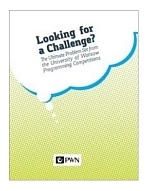|
||
• wydawnictwa polskie
• Zamów informacje o nowościach z wybranego tematu • kontakt
• Cookies na stronie |
LOOKING FOR A CHALLENGE? THE ULTIMATE PROBLEM SET FROM THE UNIVERSITY OF WARSAW PROGRAMMING COMPETITIONDIKS K.M. IDZIASZEK T. ŁĄCKI J. RADOSZEWSKI J. EDITORSwydawnictwo: PWN , rok wydania 2018, wydanie IIcena netto: Looking for a challenge?The ultimate problem set from the University of Warsaw programming competitionContest tasks say a lot about the quality of a programming competition. They should be original, engaging and of different levels of difficulty. Finding a solution should cause the contestant to feel great satisfaction, whereas being unable to solve a given task should encourage an individual to broaden their knowledge and develop new skills. This book contains the best tasks from algorithm and programming competitions organized or co-organized by the University of Warsaw, together with their exemplary solutions. The selection of the tasks was undertaken by people who have played significant roles in the history of Polish algorithmic and programming competitions as their participants or organizers. All of the authors of texts presented in this book are closely affiliated with the Faculty of Mathematics, Informatics and Mechanics at the University of Warsaw, whether as former or current students or as academic staff. Each of the tasks presented and discussed in this book was used during one of the following events:
The authors of the texts presented in this book are closely affiliated with the
University of Warsaw and have had a significant impact on the course of the history of
algorithmic and programming competitions organized or co-organized by the University. Due
to the nature of this book, we have limited ourselves solely to people who have experience
in writing and solving competition tasks. Each author was asked to choose the two tasks that they found the most interesting from competitions co-organized by the University of Warsaw, and to discuss their solutions. The choice was based on the level of difficulty of the tasks, the methods and techniques of solving them, their educational value or the particular author’s personal memories of a specific task. Each task and description of its solution is preceded by a short biography of the author, illustrating the links between their careers and programming competitions as well as their scientific and private interests. 450 pages , Paperback Księgarnia nie działa. Nie odpowiadamy na pytania i nie realizujemy zamówien. Do odwolania !. |


